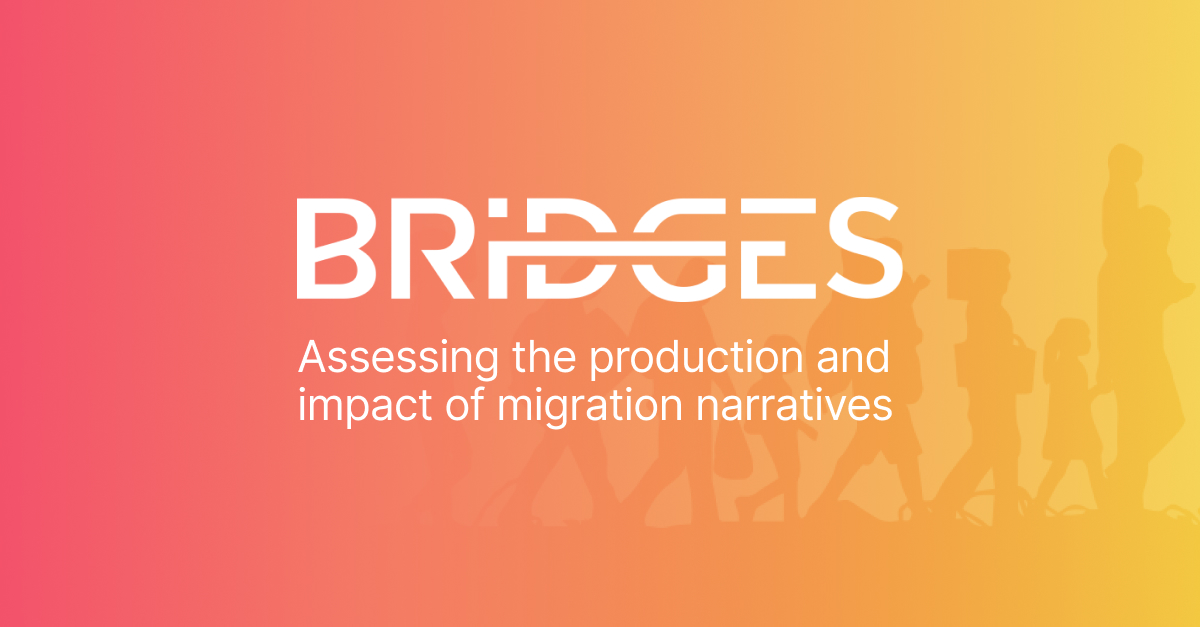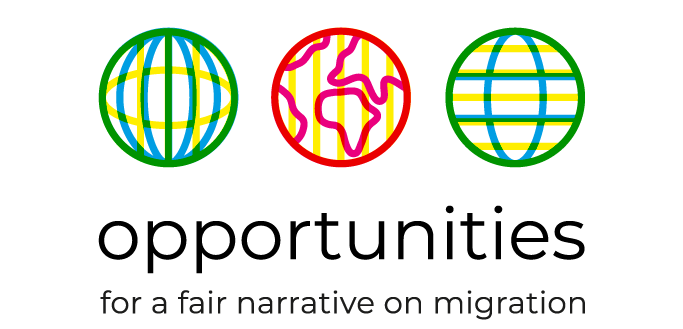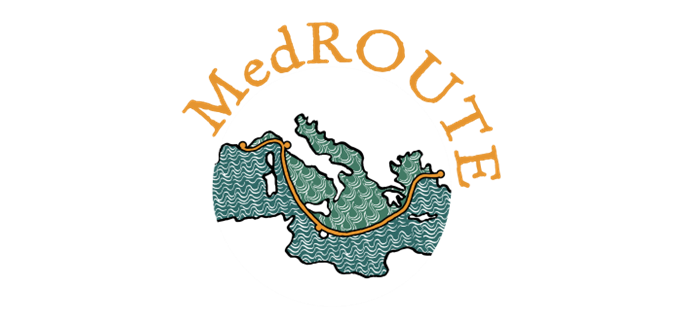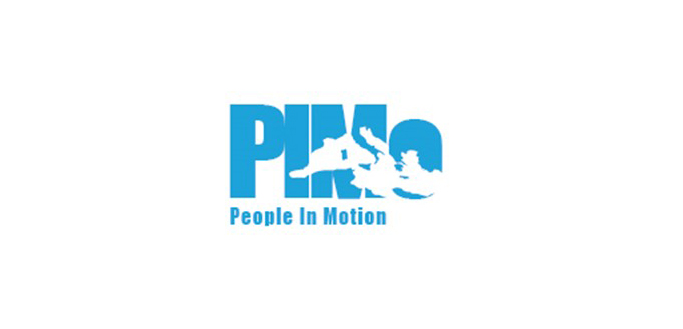INSPIRING PROJECTS

BRIDGES is an H2020 project that aims to understand the causes and consequences of migration narratives in a context of increasing politicisation and polarisation with a three-fold objective: analysing the processes of narrative production and impact, and why some of them become dominant over others, from an academic perspective; fostering evidence-based policies by providing recommendations at the EU and national levels; and societal, by creating spaces for dialogue between actors involved in narrative production. To do so, BRIDGES adopts an interdisciplinary and co-productive approach and is implemented by a diverse consortium of 12 universities, research centres, think tanks, cultural associations, and civil society organisations from all over Europe. The project aims to build BRIDGES between disciplines and methodologies, between different stages in the development of migration narratives, and between research and practice. BRIDGES focuses on Europe as a whole, and on six countries in particular: France, Germany, Hungary, Italy, Spain, and the United Kingdom.

Crises as OPPORTUNITIES: towards a Level Telling Field on Migration and a New Narrative of Successful Integration
The H2020 OPPORTUNITIES project seeks to overcome the toxic debate on migration in Europe, which undermines the process of European construction itself, by creating a forward-looking debate grounded on a fair dialogue on migration and successful integration. It brings migrants, citizens and stakeholders together to learn to listen to each other and to create a common story. An enriched art of storytelling is at the heart of the project. The result is a common story that opens a window of opportunities to start a fair dialogue on migration. The aim is to establish these cross-talks methods at the local and regional levels in several European and African countries, inviting policymakers and civil society actors to implement them. By doing so, the project seeks to demonstrate how a reactive mode of crisis management can be transformed into a shared new narrative of integration, using the potential of stories to foster cross-cultural understanding. Moreover, OPPORTUNITIES uses art-based methods and an international theatre production to promote this fair dialogue.

MedRoute
MedRoute is Global MSCA fellowship, developed at the Istituto di Storia per l’Europa Mediterranea del Consiglio Nazionale delle Ricerche (ISEM-CNR), and the Department of History at University of Maryland at College Park between 2017 and 2020. Sailing from one point to the other of the Mare Nostrum, MedRoute inquires the phenomenon of multiculturalism in four Mediterranean port cities of the late 17th and the early 18th centuries. Through the employment of three identity markers (foodways, clothing, and language), the project aims to chart how differences in the political and physical environments affected the balance of acculturation in the port-cities of Izmir, La Valletta, Livorno and Marseille. Although very different amongst themselves, culture contact and the environmental similarity allow their comparison in the different kinds of cohabitation developed, shading light on the ways different multicultural spaces were took shape in pre-modern Mediterranean and on how members of foreigner groups handled coexistence following different strategies. In analysing identity as a dynamic process and “a way of doing things”, MedRoute enters into the historiographical debate on the One-Plural nature of the Mediterranean on two critical levels: the ways in which Mediterranean identities interact with one another and how they generate a multicultural zone.

PIMO – People in Motion: Entangled Histories of Displacement across the Mediterranean (1492-1923)
Cost Action 18140 People in Motion: Entangled Histories of Displacement across the Mediterranean, or PIMo, explores common forms of displacement and dispossession across the Mediterranean from the fifteenth century to the present. Charting similarities – and significant differences – in the experience and representation of human movement, our research seeks to understand the emotional drivers and significance of dislocation for individuals and communities during the period between the expulsion of Jews from Spain and the Lausanne Treaty. With a focus on people – and the ideas, objects, and writing that accompanied them – our goals include evaluating the ways and degree to which these historical events and experiences continue to shape contemporary representation of migration and displacement in the modern world, and to build a functional and highly-creative interdisciplinary network of collaborators from around the world who will continue this conversation after the life of the grant.
Giovanni Tarantino (Action Chair) and Katrina O’Loughlin (Vice-Chair)

EasyRights
We are a European H2020 project and our aim is a simple one – to combine co-creation and AI technology to make it easier for immigrants to understand and access the services they are entitled to. Bringing together immigrants, the public sector, and private organisations, easyRights have developed solutions that provide personalised, context-aware information to its users, taking into account background, demographics, and language skills. The tools support immigrants in their search for responses to different needs in a manner that saves time for both migrants and for social service staff and cutting costs for the public administration. The easyRights solutions are co-created and developed in four pilot locations (Birmingham, Larissa, Palermo, and Malaga). easyRights tackles two major challenges to successful immigrant integration. (1) Physical – simplifying the complexities of international, national and local norms that differentiate its mechanisms across the countries; and (2) Social – we aim to change the diffuse, albeit wrong, feeling that immigrants have about themselves as ‘illegal citizens’ that acts as an impediment to the full exercise of their acknowledged and endorsed rights.

This project has received funding from the European Union’s Horizon 2020 research and innovation programme under grant agreement No 101004539. The content does not necessarily reflect the opinion of the European Commission. The European Commission is also not responsible for any use that may be made of the information contained therein.
Photo credits: Mohamed Keita
NEWSLETTER

تلقى هذا المشروع تمويلًا من برنامج Horizon 2020 للبحث والابتكار التابع للاتحاد الأوروبي بموجب اتفاقية المنحة رقم 101004539 ويجمع 12 منظمة شريكة مختلفة.
النشرة الإخبارية
Copyright 2023 Ithaca. All right reserved.
Powered by Università degli Studi di Modena e Reggio Emilia (UNIMORE).

